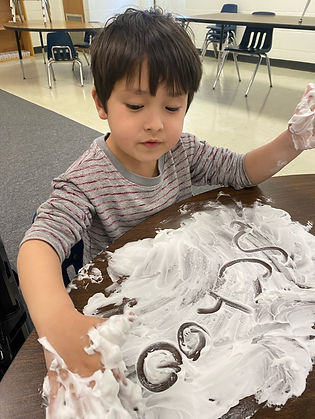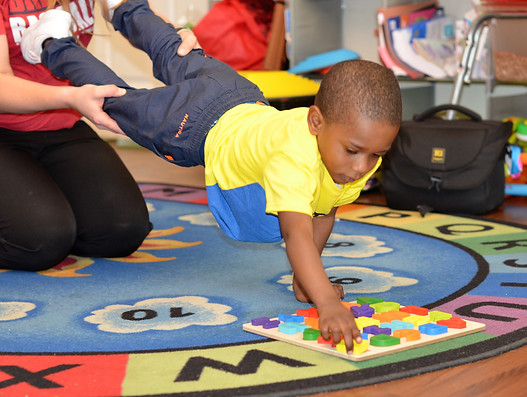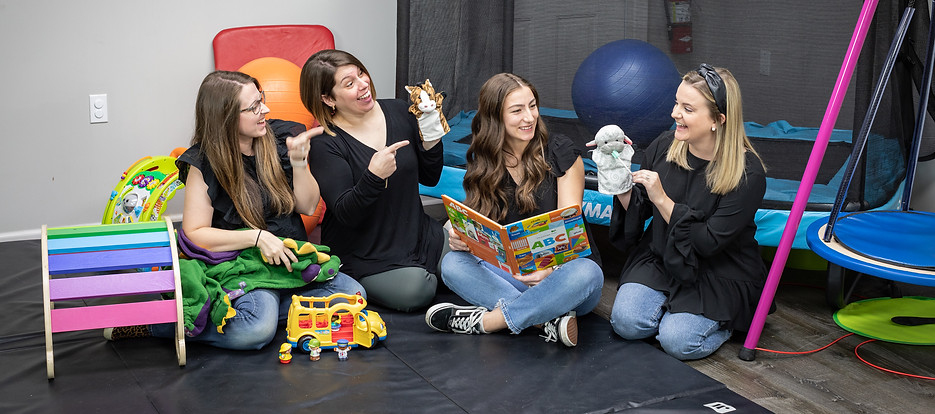Occupational Therapy
Pediatric occupational therapy focuses on the “occupations” of childhood: play, socialization, self-care and school performance.

-
Fine Motor Skills
-
Visual Motor Skills
-
Motor Coordination Skills
-
Visual Perception Skills
-
Hand Eye Coordination
-
Self-Care Skills
-
Feeding Skills
-
Sensory Processing
-
Behavior
-
Emotional Regulation
-
Attention
-
Aversions
-
They do this by:
-
Improving upper extremity muscle strength, endurance, range of motion, coordination, fine motor abilities and function
-
Recommending strategies for
managing decreased or emerging function and movement which may include assistive equipment
-
Working on social and peer interaction skills
-
Providing education to caregivers
-
Consulting with other professionals
-
Collaborating with caregivers and child to create effective carry-over from the occupational therapy provision site to home
Pediatric Occupational Therapists specialize in the evaluation and treatment of children with delays or differences in:



Learn how our services may help your child. Click here to find out!
Speech Therapy
The goal of pediatric speech therapy is to promote independence in communication
and safe and effective eating and swallowing skills.

Pediatric Speech Therapists specialize in the evaluation and treatment of children who struggle with:
-
Receptive Language
-
Expressive Language
-
Oral Motor Skills: chewing and swallowing
-
Fluency
-
Apraxia of speech
-
Pragmatic/Social Language
-
Memory
-
Cognition
-
Reading/Literacy Difficulties
-
Augmentative Communication
-
Auditory Processing
-
Articulation and Phonology
They do this by:
-
Language intervention activities:
-
by playing and talking
-
using pictures, books, objects, or ongoing events to stimulate language development
-
modeling correct vocabulary and grammar
-
repetition exercises to build language skills
-
-
Articulation (or sound production) intervention activities:
-
Modeling correct sounds and syllables in words and sentences
-
-
Oral-motor/feeding and swallowing intervention activities:
-
oral exercises — including facial massage and various tongue, lip, and jaw exercises — to strengthen the muscles of the mouth for eating, drinking, and swallowing
-
introduction of different food textures and temperatures to increase a child's oral awareness during eating and swallowing.
-
-
Providing education to caregivers
-
Consulting with other professionals
-
Collaborating with caregivers and child to create effective carry-over from the speech therapy provision site to home



Learn how our services may help your child. Click here to find out!
Physical Therapy
The goal of pediatric physical therapy is to promote independence, increase participation, facilitate motor development and function, and improve strength and endurance.
Pediatric Physical Therapists specialize in the evaluation and treatment of diagnoses that limit physical function. Physical therapists address skills that help children take part in:
-
Gross Motor Skills
-
crawling
-
rolling
-
walking
-
running
-
jumping
-
-
Positioning and mobility of
-
walkers
-
wheelchairs
-
other mobility aids
-
-
Balance
-
Agility
-
Core and Extremity Strength
-
Muscle tone and strength
-
Posture/postural control
-
Pre-gait and gait training
-
Locomotion patterns
-
Neuromuscular function
-
Endurance
-
Musculo-skeletal conditions
-
Body alignment
-
Environmental adaptations/seating and positioning
-
Splinting/bracing/orthotics
They do this by:
-
stretching
-
massage
-
therapeutic exercise
-
encouraging appropriate motor development to enhance the child’s capabilities and prevent additional impairments
-
assessing and modifying environmental obstacles that might impede optimal performance
-
Providing education to caregivers
-
Consulting with other professionals
-
Collaborating with caregivers and child to create effective carry-over from the physical therapy provision site to home



Learn how our services may help your child. Click here to find out!
.png)